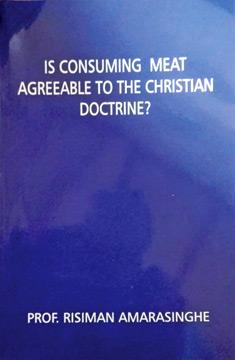
‘Is consuming meat agreeable to the Christian doctrine?’
Author: Prof. Risiman Amarasinghe
S. Godage Publishers, Colombo 10
Price Rs 450Prof. Risiman Amarasinghe’s latest book ‘Is consuming meat agreeable to the Christian doctrine?’ has a wonderful and a pithy preface: “The topic of this book is controversial. Read with a critical mind and accept the truth.” Not only a reader but also a reviewer has to tread softly as far as meat eating is concerned. This is because the world consists of meat eaters, vegetarians and vegans. I do not think anybody has done a survey to find out how many people are vegetarians and how many are non-vegetarians. However, we can safely assume that there are more non-vegetarians than vegetarians in the world.
Against such a background the learned professor raises a serious question: “Is consuming meat agreeable to the Christian doctrine?” In five chapters running into 80 pages he discusses the vexed question admirably. True prophets and religious leaders have opposed the habit of flesh-eating but their voice has been effectively silenced by pseudo prophets. The author quotes John Milton who wrote in ‘Paradise Lost’ that people who lived in the Age of Innocence ate only ‘savoury fruits’ to satisfy their appetite. According to Ovid, those who lived in the Golden Age were content with food nature provided.
Apart from literary men, eminent biologists such as Owen, Cuvier, and Lawrence believed that man is by nature vegetarian. However, the author says there are two contradictory views in the Old Testament. In one account of the story of creation, God said, “Behold, I have given you every herb yielding seed … and every tree … the fruits of a tree … shall be meat for every beast of the earth, and to every fowl of the air, and to everything that creepeth upon the earth.” However, Genesis says “Every moving thing that liveth shall be food for you.” The author avers that the former account of vegetarianism came before the Fall and the latter version surfaced after the Fall.
Testimony
The most striking testimony for vegetarianism is the story of Daniel who was commended by God because he abstained from flesh-eating. It is true that those who defend vegetarianism try to return to the Golden Age or Age of Innocence when all creatures lived in peace without the fear of being killed by man to satisfy his taste-buds. The author is adamant in his resolve that even Jesus Christ abhorred meat-eating. There is also the ethical argument that if the Master was given to flesh-eating habit, he did not qualify to be a perfect human being.
According to the author, the church seems to be in a dilemma whether to approve or disapprove the meat-eating habit. Rev. J. Todd Ferrier pointedly questioned, “How is it that the churches are so powerless to bring to earth the Kingdom of God?” If the church approves the inhuman practice of flesh-eating, then there is some kind of religious materialism and spiritual blindness.
Apart from references to religious doctrine, the author comes up with a practical argument. How can the soul attain purity when the body is filled with all kinds of impurities? One reason for the modern world’s mounting problems is man’s greed for animal flesh. He tortures or hunts innocent animals either for food or pleasure. If all the creatures are God’s creations, how can man kill animals and eat their flesh?
Did primitive man eat animal flesh? After surveying the gamut of historical facts and authoritative opinions, the author puts forward the theory that the primitive man was a vegetarian. Genesis 1:29 says, “And every fruit tree bearing fruit and every herb bearing seed, to you they shall be for meat.” Even the ancient Sumarians, Assyrians, Egyptians, Greeks and Romans did not eat animal flesh. The reason was that man and animals were living in harmony.
Primitive man
Then how did flesh-eating habit take root? The author says the killing and eating of animal flesh first occurred in the act of propitiating sacrifices. Slowly, even Christian priests began to eat animal flesh. The author quotes a Biblical account (Gen. 9) “When man was given permission to kill animals and eat their flesh, animals were also given permission to slay and eat human beings.”
Hippocrates, called the Father of Medicine, who lived 400 years before Jesus Christ said, “In the beginning man subsisted on the spontaneous products of the earth, and received his food in the same simple and natural condition as the lower animals did.” According to Plutarch, “The ancient Britons began to grow old at 120.” Goldsmith said, “Their food consisted almost exclusively of acorns, berries, herbs, roots, and water.” What is more, King Cyrus who raised Persia from an obscure colony into an empire subsisted on vegetable food and water. The author gives a graphic description of many other personalities who were confirmed vegetarians.
Medical view
Prof Amarasinghe then turns his attention to medicine and modern vegetarians. The British Medical Journal says, “Beef tea, meat soups, and extracts contain the maximum of excretion products and the minimum of nutritive matters.” The celebrated dramatist George Bernard Shaw and novelist Robert Louis Stevenson were confirmed vegetarians.
P.B. Shelley, a contemporary of Byron, wrote the following poem against the flesh-eating habit:
My bretheren, we are free! The fruits are growing
Beneath the stars, and the night—winds are flowing
O’er the ripe corn; the birds and beasts are dreaming
Never again may blood of bird or beast
Stain with his venomous stream a human feast,
To the pure skies in accusation streaming.
Prof. Amarasinghe in writing the book has argued his case against flesh-eating quoting chapter and verse from the Bible and several other sources. Now it is up to the jury, consisting of readers, to pass their verdict.
